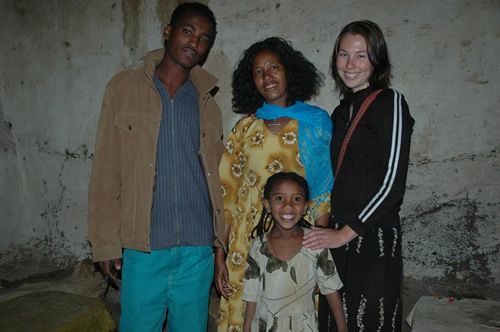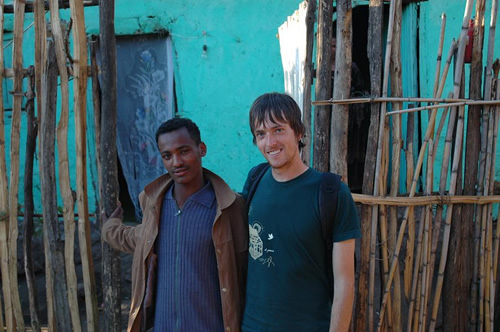Coffee: A Universal Language
A Trip to Ethiopia
By Jenny Williams

|
|
Mekonen's family with the author in Ethiopia. Photo by Jenny Williams.
|
From the outside, it looked like every other house in this small Ethiopian village: a crumbling cement block topped by a corrugated iron roof, separated from its neighbors by a gap-toothed fence. The room within was dark, punctured only by the light slanting through the open door.
We stooped our heads beneath the low frame and followed Mekonen inside. A thin, wiry woman with frizzy hair materialized out of the black, a smile spanning her weathered face.
“My mother,” said Mekonen. “She make coffee.”
She shook my hand first, then my boyfriend Randy’s, and beckoned for us to sit. We felt distinctly awkward, not knowing the proper etiquette and unable to speak to our companions in their language, Amharic. We had only met Mekonen the night before when we’d sat side by side at a tej bet — a bar serving locally brewed honey wine and millet beer. That space had been nothing more than an open square room, with benches built into the walls and a few knee-high tables. They’d covered the dirt floor with dried grass and laid three or four sheepskins across the hard seats.
Mekonen had invited us to experience a traditional Ethiopian coffee ceremony — our first in the country that lays claim to the drink’s original discovery. One legend attributes the find to an Ethiopian herdsman living nearly 3,000 years ago who noticed his goats acting hyper after eating certain red berries. The herder plucked a few for monks in the village, who dismissed the berries as sinful and cast them into the fire. Later, the sizzling scent of roasting beans proved too great a temptation, and the monks rescinded their earlier declaration — much to the delight and gratitude of generations of coffee drinkers down the line.

|
|
Mekonen and Randy. Photo by Jenny Williams.
|
Today, coffee is the country’s leading export, bringing in two thirds of total earnings. Ethiopians are dependent on the industry, with 98% of coffee production occurring on small plots owned by individual farmers. The drink occupies a sacred place in Ethiopian culture; getting invited to a coffee-making ceremony is a great honor, and we tried our best to deserve the hospitality.
Mekonen’s mother began by roasting the beans over a small charcoal-burning stove, making the room crackle with the sound of the fire-licked skillet. Next, she poured the blackened beans into a bowl. She started crushing them with a heavy wooden pestle, releasing another waft of rich scent with each blow into the air. Traditional ceremonies often involve burning incense as well — but I was glad to be able to focus on the smell of the coffee alone. The grinding rhythm was slow and relaxing, and I let myself ease into my seat.
If the ritual wasn’t fascinating enough, a constant stream of babies and chickens through the dim room provided a rolling backdrop. Some of the children belonged to Mekonen’s family — though it was unclear which ones. It’s common practice in African villages for kids to roam free; whichever woman is closest is that child’s mother.
When the beans had been ground to a fine powder, our hostess mixed them with water and put the pot over the flame. While the concoction heated, Mekonen took us through the back door to his bedroom: a sagging cot piled high with blankets, nestled in a narrow space beneath a low ceiling. Next to his bed sat a scruffy pillow — where his chicken roosted each night, he told us. He’d bought the beloved chick when it was newly hatched for just a few Ethiopian birr (less than 50 cents). The eggs she laid provided an essential source of protein for the family. However, Mekonen explained, finding the money to feed her was sometimes challenging.
Under the gentle tentacles of our curiosity, Mekonen slowly opened up. The more questions we asked, the more Mekonen wanted to talk. His language was halting and imperfect — but it was genuine. He spoke of their money troubles without self-pity or resentment; despite our conspicuous comparative wealth, he made no pleas for charity.
Feeling emboldened by his talkativeness, I asked about a girl we’d met earlier who had been wearing all black. Mekonen said she was a friend, though she had essentially become part of the family since her father died last year. The all-black get-up was part of traditional Ethiopian mourning.
“We show sadness very much,” he said. “At funerals, we hit our chest and cry, sometimes we bleed with so much crying.”
Back in the front room, the coffee was ready. We hushed into our seats and watched the final act. With a grace usually reserved for sommeliers at five-star restaurants, Mekonen’s mother tipped the pot from a full foot above the floor and let the deep liquid spill into four espresso-sized mugs with chipped edges (tradition dictates that an extra is always poured). These were placed on a tray and presented to us where we sat.
The first sip bestowed a delicious surprise: she’d added lots of sugar while we were out of the room. The liquid was syrupy and black, dancing the perfect bitter-and-sweet balance. I closed my eyes to drown out all senses other than taste. Fine grounds lolled against my inner cheek; the warm liquid seeped from my mouth to the back of my throat, coating the passage down to my happily gurgling stomach.
While we relished, our hostess boiled the grinds in the pot and let them settle. This became the second cup, during which the remaining mixture was again boiled for drinking in the third and final round. With each cup, the coffee became more complex and delicious. Subtle new flavors surfaced and went under — the smoke of charcoal, the tang of sugar cane, a touch of the earth — thrilling my tongue and infusing my body with a sense of richness.
I glanced at Mekonen and noticed that his features, too, had relaxed in the face of our delectable treat. Had he so quickly forgotten his financial woes, his grieving friend? Hardly likely. But something in his slackened eyes told me that, for a moment, these things might be put aside. For a moment, he was just a boy in the company of family and friends, indulging in a simple pleasure. I felt more connected to him in that instant than in all the previous minutes.
Getting to know a place, a people, a person — it takes time, and patience. And care. Like making coffee. By the end of our visit, I still knew relatively little about Mekonen’s generous family and their humble lives. But something in the afternoon’s events had scratched the surface, ever so slightly, and released a hint of the depth that lay beneath.
I can’t say for sure that it was the coffee that did it. I do know that when we left the little house on the lane, with its ribbed iron roof and fragmentary fence and sinewy bodies waving goodbye, the air still suggested the vaguest trace of espresso — and the house no longer looked just like the rest of them.
Jenny Williams recently
returned from a two-year journey through the Middle East, Africa,
India, and Southeast Asia.
|
